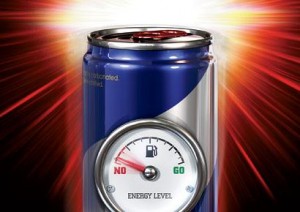 Recently a 14-year-old Maryland girl died after drinking 2 Monster Energy drinks in a 24-hour period. One 24 oz can has as much caffeine as seven 12 oz cans of regular soda. That means this girl took in 14 times the amount of caffeine in 2 cans of regular soda in 24 hours. It was also learned that the girl had an underlying heart condition which this jolt of caffeine aggravated and lead to her death.
Recently a 14-year-old Maryland girl died after drinking 2 Monster Energy drinks in a 24-hour period. One 24 oz can has as much caffeine as seven 12 oz cans of regular soda. That means this girl took in 14 times the amount of caffeine in 2 cans of regular soda in 24 hours. It was also learned that the girl had an underlying heart condition which this jolt of caffeine aggravated and lead to her death.
In addition, at least 4 other people have died after drinking high-energy drinks. As a result, the FDA has stepped in to investigate, not only the deaths, but whether they should be regulating these high-caffeine energy drinks. Let me tell you about the particular health concerns of these high-caffeine energy drinks.
The Effects of Too Much Caffeine on Your Body
Energy drinks are a $10 billion industry today. There are many different brands of them that people drink several times a day. As I said earlier, some of them may contain several times the amount of caffeine as 1 cup of coffee or one 12-ounce can of caffeinated soft drink. Doctors around the country have reported seeing patients with negative health effects after drinking high-caffeine energy drinks. Some of them, ranging from mild to severe, include:
- Rapid, pounding heart beats which can lead to dangerous arrhythmias, stroke and/or sudden collapse, fainting, passing out
- High blood pressure spikes, headaches
- Insomnia
- Increases of stress hormone, cortisol
- Tremors, muscle spasms
- Increases in insulin resistance, leading to dangerous belly fat gain
- Dehydration, leading to constipation, bloating
- Increased irritability, inability to concentrate, focus
In a recent Fox News article [FDA investigating link between energy drinks, health problems, Fox23 News, October 2012], a cardiologist, David Brewer, M.D., from Ohio State University, stated that he would like to see these energy drinks regulated. “Regulation is probably good if we’re ingesting something into our bodies…at least so far as to keep them out of the hands of kids.”
But too-high caffeine energy drinks are not only a problem for young people. Older people (especially men) can be much more sensitive to the effects of caffeine and develop dangerous high blood pressure, arrhythmias and/or strokes as a result.
Earlier this year a study out of the University of Miami Miller School of Medicine and Columbia University found that even 1 diet soda a day, was linked to a 43% higher risk of heart attack or stroke. Since it’s diet soda, people tend to drink 2-3 of them a day – that could well surpass 600 mg of caffeine daily, a level that health professionals say is too much.
Most diet sodas (particularly colas) also contain artificial sweeteners like aspartame that have also been linked to stroke. Also, caramel coloring, contained in most cola, has also come under fire for vascular lining problems, which can also add to the risk.
How Much Caffeine Is Safe?
Recent studies have shown that moderate caffeine intake (3 cups of coffee) every day can help older people (65-88) have better cognitive skills and, perhaps, even prevent Alzheimer disease. The Mayo Clinic [Caffeine: How Much is Too Much?] says that up to 400 mg a day – the amount in about 2-3 cups of brewed coffee – is moderate and shouldn’t pose health problems to most people.
However, amounts over 500-600 mg caffeine a day, can lead to other health problems such as those mentioned above. Certainly, then, the caffeine contained in most commercial energy drinks would be far too high for most people. The fact that several deaths have occurred associated with their usage is, I feel, the most telling red flag for the following:
- They should be regulated as to how much caffeine is contained in them
- They should be adequately labeled as to their possible health hazards and interactions with certain medications like antibiotics, asthma drugs, Echinacea, etc.
It’s not just energy drinks that have posed a too-high caffeine consumption issue. They have, however, forced a glaring public spotlight on the health hazards of too much caffeine. A few years ago, a popular, high-caffeine content black tea, Fast Lane, was also taken off the market because of a death associated with its usage. Even over-the-counter medications can contain a lot of caffeine. Aspirin has as much as 130 mg of caffeine in one dose!
My Recommendation
Although you may be able to tolerate one, high-caffeine energy drink here and there, chronic, heavy consumption could cause serious, perhaps fatal, consequences. Do your body a favor and wean yourself away from these high-caffeine drinks. Instead, increase your B-Complex, L-carnitine, alpha-lipoic acid, and protein, intake. You’ll sleep better and have more natural energy and won’t need to rely on monster caffeine doses to power your days.
Stay Well,
Mark Rosenberg, M.D.
Natural Health News
FDA investigating link between energy drinks, health problems, http://www.fox23.com/news/local/story/FDA-investigating-link-between-energy-drinks/Gtv0zIt9_kWUOQ8ARPP3ww.cspx
Diet Soda A Day Linked with Higher Risk of Stroke, http://www.huffingtonpost.com/2012/02/01/diet-soda-stroke-heart-attack_n_1247195.html
USF Health News – High blood caffeine levels in older adults linked to avoidance of Alzheimer, http://hscweb3.hsc.usf.edu/blog/2012/06/04/high-blood-caffeine-levels-in-older-adults-linked-to-avoidance-of-alzheimers-disease-usf-um-study-reports/
Caffeine: How Much is Too Much? http://www.mayoclinic.com/health/caffeine/NU00600
photo credit: prevention.com
